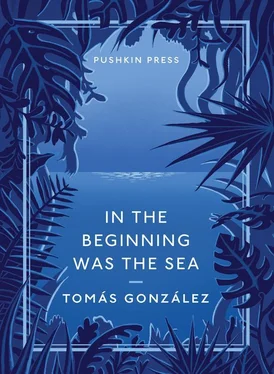As winter drew to a close, J. became obsessed with planting. He planted mangoes on what would be the terrace of the new house, pineapples on the slopes of the hill — leaving a single strip of bare earth into which he planned to cut a flight of stone steps leading to the summit — and orange trees around the paddocks.
And as winter drew to a close, he began to write in a huge journal that, for want of a better name, he called “the book”. The two-thousand-page volume bound in black leather had been made by a friend, a craftsman at the Coltejer factory with a love for bookbinding. His friend had initially intended to make and then write a great book. “A big fuck-off book,” he explained, “using every single word in the dictionary.” To J. — who had always been fascinated by futile intellectual pursuits, which were a part of his inchoate and confused revolt against culture — the book was a fascinating project. Whenever they met up, he would excitedly ask his friend how the book was progressing. “I’m up to page fifteen,” his friend might say with the weary shrug of a marathon runner. “When it’s finished, I’ll show it to you.”
But his friend never did finish the book. Having reached page thirty, and having shown his work to no one — not even J., whom he respected — he ripped out the pages he had written and burned them. Perhaps his friends’ mocking contempt for his intention to remain within the constraints of the dictionary had been too much for him.
“I’m a craftsman, hermano , and a fucking good one,” he said to J., “so I’m giving you the book, maybe you can do something with it.”
Thinking it might prove useful at the finca , but mostly because he loved the object and the story behind it, J. had packed it—1,970 blank pages — along with the other belongings he brought with him to the sea.
June 4, 1976: Today Don Eduardo brought four hundred pineapple shoots. He charged two pesos each. He brought them on an old pack mule he calls God’s Creature.
Heavy grey clouds are building up to the south. If we plant them out this morning, the rains might wash away the newly planted shoots.
Don Eduardo says he knows a herbal poultice that can prevent and treat the fungal infection. Elena doesn’t believe a word the old man says — actually, he’s not that old, from what I hear — but I’m prepared to smear my feet with anything if it stops the infection coming back.
One of the cows calved last night, but the heifer was stillborn.
They had no luck with their livestock. In the first month after their arrival, lightning struck an ox and her calf. Shortly afterwards, two cattle disappeared, probably stolen. There was an investigation and a case was filed — the policeman had no idea how to use a typewriter, so J. had to type the statement himself — but the case was never resolved. Vague suspicions and scurrilous rumours all pointed to Doña Rosa’s youngest son, Roberto, the black sheep of the family, being the guilty party, and to Juan, the local shopkeeper, having bought the stolen cattle. Juan had a reputation for buying stolen goods and Roberto for being a wastrel and a drunk. But no one other than Elena had been prepared to swear the men were guilty, and Elena had no proof.
The fact remained that they now had twenty-nine head of cattle — precisely the same number as when they arrived. The calves that were born had made up for those lost, but they had to be raised and fattened and so, partly to increase the herd, and partly because he liked the look of the beast, J. bought a magnificent stud bull. He bought it despite the qualms of Elena and even Gilberto, who rightly felt that they did not need the animal since a neighbour was prepared to rent them a bull at little expense. The bull was meek, tall as a cathedral, patriarchal; a sturdy and baroque structure festooned with folds and cascading muscles. In the paddock, it looked spectacular.
“A miracle of nature,” commented J.
“…and a complete waste of money,” snapped Elena.
The easing of the rains brought about a change in Elena’s mood. Her bitter silences gave way to a biting sarcasm that became her habitual tone even in moments of affection. In addition to running the shop and using the sewing machine — to make curtains, blankets, sheets — and fastidiously supervising domestic arrangements, she now went for long dips in the sea. She would usually set off at 11 a.m. with a towel over her shoulder and a bottle of suntan lotion and return shortly before noon. She would regularly complain to J. that the local black men frequently ambled closer to where she was sunbathing so they could stare at her.
Mercedes was expected to keep a lookout for Elena so she could serve lunch promptly. If it was not on the table when Elena arrived home, she would rudely take Mercedes to task. This brusqueness in the way she treated people became routine, and over time it got worse. Gilberto had already complained to J. about Elena’s offensive way of speaking to his wife.
“She can talk to me how she likes, jefe , I don’t care,” he said, “but my wife is a timid soul and all this criticism just upsets her.”
J. had little time for Gilberto’s wife, and in fact often shared Elena’s view that she was lazy and useless. But he was afraid of losing Gilberto, a diligent and enthusiastic worker who took charge of every problem on the finca as though it were his own.
One day, Elena came back from her swim to find lunch was not waiting on the table.
“I’ve had a temperature, seño ,” said Mercedes, who was holding a cold compress to her forehead and genuinely looked ill.
“Temperature or no temperature, people in this house still need to eat,” snapped Elena. She felt so angry that the words got muddled in her head.
“But seño …”
“But nothing! I won’t have people in this house going hungry every time you decide to play the invalid. Now get cooking, hermana , that’s what we pay you for!”
J. arrived home to find Elena stony-faced and Mercedes wailing in the kitchen, the damp cloth still pressed to her forehead.
He flew into a rage. “Can you for God’s sake stop behaving like a lady of the manor?” he roared, without waiting for Elena to explain.
Elena was taken aback. This was the first time since they had met that she had ever seen him truly angry. And when J. went on shouting, she got angry too; she hurled herself at him and slapped his face. He grabbed her wrists and with a powerful jerk sent her sprawling out into the corridor. Elena made no attempt to get up, and simply lay there weeping bitterly.
J. stormed out of the house.
THE RECONCILIATION was no easy matter. When J. returned that night, Elena’s face was frozen in a mask of cold contempt. Silently, they undressed and went to bed, each careful to avoid any physical contact with the other. When J.’s elbow accidently grazed her, Elena flinched as though he had burned her with a cigarette; she retreated to the edge of the bed and fell into a deep, dreamless sleep.
J. stayed awake for a while and tried to read. “Don’t let them get your hopes up,” the poet says, “Today is all there is/Let pious people suffer/Life’s all earth has to offer/There’s no life after this”—but he could not concentrate. It was a long night. He closed the book, snuffed out the candle, and darkness, gentle and implacable, seeped into the room. The rising roar of the sea stole in, the sounds — and the silence — of the nearby forest; he could hear the barking of far-off dogs.
J. went out onto the veranda in his shorts. There was no moon, but the sky was clear and cloudless. He settled himself comfortably in the wicker rocking chair Doña Rosa had sold him. He set his cigarettes and matches on the floor, lit a cigarette and stared out at the water. The spray from the waves gave off a faint glow. Far out to sea, he could dimly make out the horizon. For a moment, J. thought he could see the lights of a ship, but when he tried to focus, they disappeared.
Читать дальше










